Comprehensive Guide to Garden Maintenance in Camden
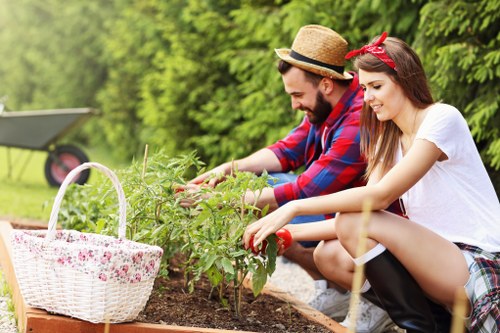
Maintaining a beautiful garden in Camden requires a blend of passion, knowledge, and consistent effort. Whether you're a seasoned gardener or just starting out, understanding the unique aspects of Camden's climate and soil can help you cultivate a thriving outdoor space.
Camden's diverse environment offers a variety of plants that can flourish with proper care. From vibrant perennials to hardy shrubs, selecting the right flora is essential for a sustainable garden.
Regular maintenance tasks such as weeding, pruning, and fertilizing are crucial in keeping your garden healthy and attractive. Implementing a maintenance schedule can streamline these tasks and ensure nothing is overlooked.
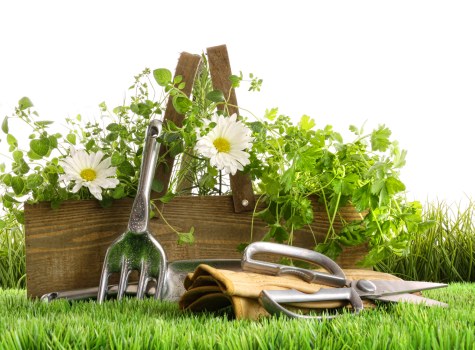
Understanding Camden's Climate
Camden experiences a temperate maritime climate, characterized by mild winters and warm summers. This climate is conducive to a wide range of plant species, but it's important to select plants that can thrive under these conditions.
Rainfall in Camden is fairly distributed throughout the year, providing ample moisture for most garden plants. However, during the summer months, occasional droughts may require supplemental watering to maintain plant health.
Understanding local weather patterns can help in planning your garden's layout and selecting appropriate plant varieties. Utilizing native plants can also reduce the need for excessive watering and maintenance.
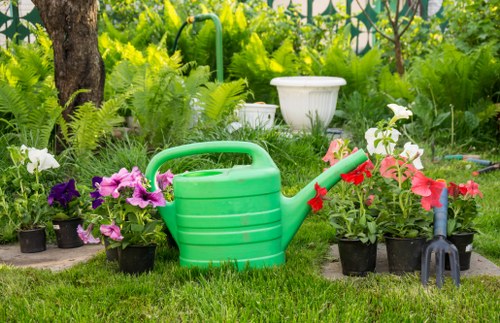
Soil Preparation and Management
The foundation of any successful garden is healthy soil. Camden's soil can vary, so conducting a soil test is recommended to determine its pH and nutrient levels. This information guides the amendment process to create an optimal growing environment.
Incorporating organic matter such as compost can improve soil structure, enhance nutrient content, and promote beneficial microbial activity. Regularly adding mulch helps retain moisture and suppress weeds, contributing to overall soil health.
Proper soil drainage is also vital. Ensuring that water does not stagnate in your garden beds prevents root rot and other water-related issues that can compromise plant vitality.
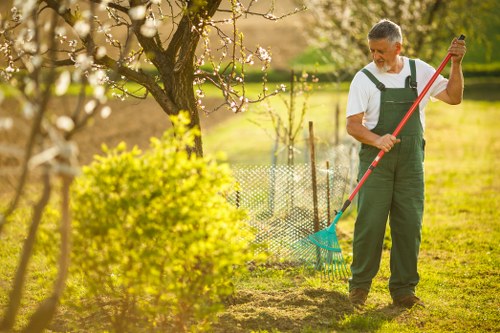
Plant Selection and Diversity
Choosing the right plants is a key aspect of garden maintenance in Camden. Opt for a mix of annuals and perennials to provide year-round interest and continuous blooms.
- Annuals: Offer vibrant colors and are great for filling gaps.
- Perennials: Provide structure and return year after year.
- Shrubs: Add height and form to your garden design.
- Trees: Offer shade and serve as focal points.
Diversity in plant selection not only enhances aesthetic appeal but also promotes ecological balance by attracting pollinators and beneficial insects.
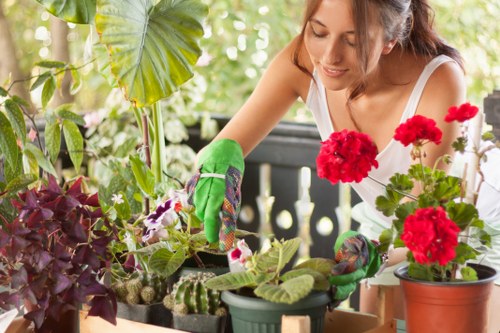
Seasonal Maintenance Tips
Spring
Spring is the perfect time to prepare your garden for the growing season. Start by cleaning up any debris from the winter months and inspecting plants for signs of disease or damage.
Planting and Pruning
Introduce new plants and prune existing ones to encourage healthy growth. Fertilize your soil to replenish nutrients and support vigorous plant development.
Weed Control
Addressing weeds early in the season prevents them from taking over your garden. Hand-pulling or using eco-friendly herbicides can be effective methods.
Summer
During the summer, focus on regular watering, especially for newly planted and drought-sensitive species. Mulching helps retain soil moisture and keeps roots cool.
Pest Management
Monitor your garden for pests and take prompt action to prevent infestations. Introducing natural predators or using organic pesticides can protect your plants without harming the environment.
Deadheading
Removing spent flowers encourages continued blooming and maintains the garden's appearance.
Autumn
Autumn is a time for harvesting remaining produce and preparing your garden for the colder months. Clear out dead plants and add compost to enrich the soil for the next season.
Leaf Management
Gather fallen leaves and use them as mulch or compost. This not only recycles organic matter but also reduces waste.
Protecting Plants
Apply frost-resistant covers to sensitive plants and ensure that perennials are well-insulated against colder temperatures.
Winter
While many plants are dormant in winter, it's still important to perform maintenance tasks. Prune trees and shrubs, and inspect structures like fences and decks for any needed repairs.
Tool Maintenance
Clean and store your gardening tools properly to extend their lifespan and ensure they are ready for use in the spring.
Planning
Use the winter months to plan your garden layout and plant selection for the upcoming year. Researching new varieties and techniques can lead to a more successful garden.
Effective Irrigation Practices
Proper irrigation is essential for maintaining a healthy garden. Camden's climate allows for a variety of watering methods, each with its own benefits.
- Drip Irrigation: Delivers water directly to the base of plants, reducing evaporation and water waste.
- Splash Irrigation: Suitable for smaller gardens but less efficient.
- Soaker Hoses: Ideal for rows of plants, providing consistent moisture.
Implementing a smart irrigation system can automate watering schedules, ensuring your garden receives the right amount of water at the right times.
Water Conservation Tips
Adopt water-wise practices such as collecting rainwater, using mulch to retain soil moisture, and selecting drought-tolerant plants to minimize water usage.
Pest and Disease Management
Keeping pests and diseases at bay is critical for garden maintenance. Camden's environment can harbor various pests that may harm your plants if not managed effectively.
- Natural Predators: Encourage birds, ladybugs, and other beneficial insects to control pest populations.
- Organic Pesticides: Use eco-friendly options to eliminate pests without harming the ecosystem.
- Proper Sanitation: Remove diseased plants and sanitize tools to prevent the spread of infections.
Regular monitoring and early intervention can prevent minor issues from escalating into major problems.
Integrated Pest Management (IPM)
Adopting an IPM approach combines biological, cultural, physical, and chemical tools to manage pests sustainably. This strategy minimizes environmental impact while effectively protecting your garden.
Pruning and Trimming Techniques
Pruning is a fundamental aspect of garden maintenance, promoting plant health and enhancing the overall appearance of your garden.
- Timing: Prune at the appropriate time of year to avoid stressing the plants.
- Tools: Use sharp, clean tools to make precise cuts and reduce the risk of disease.
- Techniques: Learn proper pruning methods for different plant types to encourage optimal growth and shape.
Regular trimming helps maintain plant size, removes dead or diseased branches, and encourages robust flowering and fruiting.
Shaping and Training Plants
Beyond health, pruning is essential for shaping plants to fit your garden design. Training vines and espaliering trees can create stunning visual effects and maximize space utilization.
Weed Control Strategies
Weeds compete with your garden plants for nutrients, water, and light, making effective control essential for a thriving garden.
- Mulching: Apply a layer of mulch to suppress weed growth and retain soil moisture.
- Manual Removal: Regularly hand-pull weeds to prevent them from establishing.
- Cultural Practices: Implement crop rotation and plant spacing to reduce weed proliferation.
Consistent weed management preserves the integrity of your garden and reduces the need for chemical interventions.
Organic Weed Control
Opt for organic methods such as vinegar sprays or natural herbicides to manage weeds without harming beneficial soil organisms or pollinators.
Fertilization and Soil Nutrition
Ensuring your garden has the necessary nutrients is vital for plant growth and resilience. Camden's soil may benefit from periodic fertilization to replenish essential elements.
- Organic Fertilizers: Compost, manure, and bone meal improve soil structure and provide slow-release nutrients.
- Synthetic Fertilizers: Offer precise nutrient ratios but should be used sparingly to avoid soil degradation.
- Soil Amendments: Incorporate materials like peat moss or perlite to enhance drainage and aeration.
Testing your soil regularly helps determine the specific nutrient needs of your garden, allowing for targeted and efficient fertilization.
Composting
Creating your own compost from kitchen scraps and garden waste enriches the soil naturally. Compost improves moisture retention, soil structure, and provides a balanced nutrient source for plants.
Garden Tools and Equipment
Having the right tools is essential for efficient garden maintenance. Camden's gardeners should invest in quality equipment to make tasks easier and more effective.
- Hand Tools: Pruners, trowels, and hoes for precise garden work.
- Power Tools: Lawn mowers, trimmers, and tillers for larger tasks.
- Watering Systems: Hoses, sprinklers, and irrigation controllers to maintain consistent watering.
Regular maintenance of your tools, including cleaning and sharpening, ensures longevity and optimal performance.
Storage Solutions
Organize your garden tools in a dedicated shed or storage area to protect them from the elements and prevent rusting. Proper storage also enhances safety and accessibility.
Lawn Care Essentials
A well-maintained lawn is a cornerstone of any garden. Camden's climate supports healthy grass growth with the right care.
- Mowing: Maintain an appropriate grass height to promote deep roots and reduce weed growth.
- Watering: Water deeply and infrequently to encourage resilient grass.
- Aeration: Improve soil aeration by perforating the lawn, facilitating better water and nutrient uptake.
- Fertilizing: Apply fertilizers during the growing season to sustain grass health.
Regular lawn care not only enhances curb appeal but also supports a healthy ecosystem by providing habitat for beneficial insects.
Dealing with Lawn Pests
Monitor your lawn for signs of pests such as grubs or sod webworms. Early detection and treatment can prevent extensive damage and preserve the quality of your turf.
Planting Techniques
Proper planting techniques are fundamental for the success of your garden. Camden gardeners should focus on factors like spacing, depth, and timing to ensure healthy plant establishment.
- Spacing: Allow adequate room for plants to grow without overcrowding, which can hinder airflow and sunlight penetration.
- Depth: Plant seeds or seedlings at the correct depth to promote strong root development.
- Timing: Plant during the optimal season for each species to take advantage of natural growth cycles.
Using raised beds or container gardening can also offer better control over soil conditions and drainage, enhancing plant performance.
Seed Starting and Transplanting
Starting seeds indoors or in a sheltered environment allows for an earlier start in the growing season. Transplanting seedlings once they are strong enough ensures a head start for your plants.
Mulching Benefits
Mulching is a simple yet effective practice in garden maintenance. It offers numerous benefits that contribute to the overall health and appearance of your garden.
- Moisture Retention: Keeps soil hydrated by reducing evaporation.
- Weed Suppression: Minimizes weed growth by blocking sunlight.
- Temperature Regulation: Protects roots from extreme temperatures.
- Soil Improvement: As mulch breaks down, it adds organic matter to the soil.
Choose from organic mulches like bark, straw, or compost, or opt for inorganic options such as gravel or landscape fabric based on your garden's needs.
Organic vs. Inorganic Mulch
Organic mulches decompose over time, enriching the soil, while inorganic mulches require replacement but offer longer-lasting coverage. Select the type that best aligns with your maintenance preferences and garden goals.
Garden Lighting and Decor
Incorporating lighting and decorative elements enhances the functionality and aesthetics of your garden, allowing you to enjoy the space even after dark.
- Path Lighting: Guides movement through the garden and highlights pathways.
- Accent Lighting: Illuminates specific plants or features, creating visual interest.
- Decorative Elements: Add personality with sculptures, fountains, or garden art.
Solar-powered lights are an eco-friendly option, reducing energy consumption while providing sufficient illumination.
Choosing the Right Fixtures
Select lighting fixtures that complement your garden style and meet functional needs. Weather-resistant materials ensure durability and safety in outdoor environments.
Hardscaping in Garden Maintenance
Integrating hardscaping elements such as patios, walkways, and fences can enhance the structure and usability of your garden.
- Patios: Provide a space for outdoor seating and gatherings.
- Walkways: Offer easy access to different garden areas while adding visual appeal.
- Fences: Define garden boundaries and contribute to privacy.
Careful planning and maintenance of hardscaping ensure that these features remain functional and attractive over time.
Maintenance of Hardscape Features
Regular cleaning and inspections prevent wear and tear, extending the lifespan of hardscape elements. Addressing issues like cracks or erosion promptly maintains the integrity of your garden design.
Sustainable Gardening Practices
Adopting sustainable practices in garden maintenance not only benefits the environment but also promotes a healthier and more resilient garden.
- Composting: Recycles organic waste into nutrient-rich soil amendments.
- Rainwater Harvesting: Collects and utilizes rainwater for irrigation.
- Native Planting: Uses plants adapted to the local climate, reducing the need for excessive watering and fertilizers.
- Organic Pest Control: Minimizes chemical usage, protecting beneficial insects and pollinators.
Implementing these practices fosters a balanced ecosystem and reduces the environmental footprint of your garden maintenance activities.
Reducing Chemical Use
Limiting the use of synthetic fertilizers and pesticides helps preserve soil health and protect wildlife. Explore natural alternatives and integrated management strategies for effective maintenance.
Seasonal Planting Calendar
Having a planting calendar tailored to Camden's climate ensures timely garden activities and maximizes plant success.
- Spring: Plant annuals, perennials, and vegetables. Begin pruning and fertilizing.
- Summer: Focus on watering, weeding, and pest control. Deadhead flowers regularly.
- Autumn: Harvest remaining crops, plant bulbs for spring, and prepare beds for winter.
- Winter: Perform tool maintenance, plan the garden layout, and protect sensitive plants.
Following a seasonal planting calendar helps maintain a consistent and productive garden throughout the year.
Adjusting for Weather Variations
Be flexible with your planting schedule to accommodate unexpected weather changes. Staying informed about local forecasts can help you make necessary adjustments to protect your garden.
Common Garden Maintenance Mistakes to Avoid
Even experienced gardeners can make mistakes that hinder garden health and appearance. Recognizing and avoiding these common errors leads to more successful maintenance outcomes.
- Overwatering: Can cause root rot and attract pests. Monitor soil moisture and adjust watering accordingly.
- Under-fertilizing: Results in nutrient deficiencies and weak plants. Follow a balanced fertilization schedule.
- Poor Pruning: Can damage plants and stunt growth. Learn proper pruning techniques for each plant type.
- Ignoring Weeds: Allows weeds to compete with your plants for resources. Stay on top of weed control measures.
Avoiding these pitfalls ensures your garden remains healthy, vibrant, and well-maintained.
Learning and Adaptation
Gardening is a continuous learning process. Stay open to new techniques and adapt your maintenance practices based on plant responses and changing conditions.
Professional Garden Maintenance Services in Camden
For those seeking expert assistance, professional garden maintenance services in Camden offer comprehensive care tailored to your garden's specific needs.
- Routine Maintenance: Regular weeding, pruning, and mowing services keep your garden in top shape.
- Seasonal Cleanup: Prepare your garden for upcoming seasons with specialized cleanup and preparation services.
- Design and Renovation: Transform your garden space with professional design and renovation expertise.
Hiring professionals can save time and ensure that your garden receives the highest level of care, enhancing its beauty and functionality.
Choosing the Right Service
Select a garden maintenance service that aligns with your goals and budget. Look for experienced providers with positive reviews and a portfolio of successful projects in Camden.
DIY Garden Maintenance Tips
If you prefer a hands-on approach, implementing DIY maintenance strategies can be both rewarding and cost-effective.
- Create a Maintenance Schedule: Organize tasks by frequency and season to stay on track.
- Educate Yourself: Read gardening books, attend workshops, and join local gardening groups for valuable insights.
- Invest in Quality Tools: Well-maintained tools make gardening tasks easier and more efficient.
With dedication and the right resources, you can achieve a beautiful and healthy garden through your own efforts.
Time Management
Allocate specific times for gardening activities to ensure consistent maintenance without feeling overwhelmed.
Enhancing Garden Biodiversity
A diverse garden supports a wide range of wildlife, creating a balanced and resilient ecosystem in Camden.
- Plant Variety: Incorporate different plant species to attract various pollinators and beneficial insects.
- Habitat Features: Add birdhouses, insect hotels, and water sources to encourage wildlife presence.
- Native Plants: Utilize plants native to Camden to support local fauna and ensure adaptability.
Promoting biodiversity not only enriches your garden but also contributes to environmental sustainability.
Pollinator Gardens
Create dedicated spaces with flowering plants that attract bees, butterflies, and other pollinators essential for plant reproduction.
Conclusion
Effective garden maintenance in Camden involves a comprehensive approach that includes understanding the local climate, preparing the soil, selecting appropriate plants, and implementing sustainable practices. Whether you choose to manage your garden independently or seek professional services, consistent care and informed decisions are key to cultivating a beautiful and thriving garden.
By following the tips and strategies outlined in this guide, you can enhance the health and aesthetics of your garden, creating a peaceful and inviting outdoor sanctuary in Camden.
Contact us today to learn more about how you can achieve the garden of your dreams with expert maintenance services tailored to your needs.
